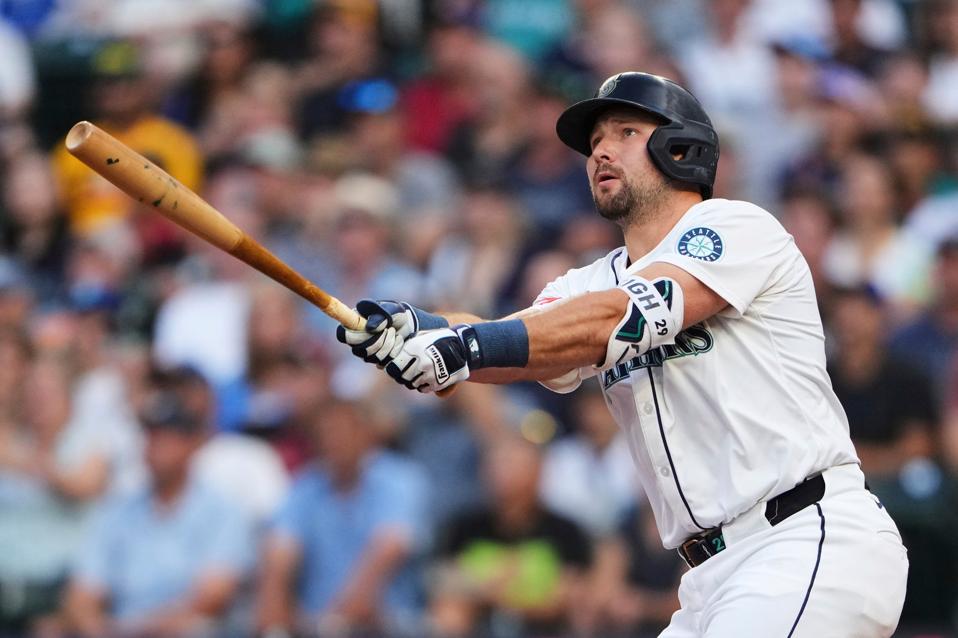Sometimes MVP races are rather obvious like in the case of Shohei Ohtani, who is on a three-year run of winning it unanimously with the Angels in 2023 and in the past two seasons for the Dodgers.
Or in the case of Aaron Judge, whose 58 homers and 144 RBIs made him the unanimous AL MVP last season.
In other years it is kind of obvious but there is a worthy challenger, whose exploits produce a spirited and ultimately fun debate.
Such is the case of Judge getting the AL MVP over Cal Raleigh, whose strong case of 60 homers and 125 RBIs made the race a close finish. Judge won the race by 20 points (355-335) by getting 17 of the 30 first-place votes, including a split ticket among New York and Boston voters.
It resulted in the closest AL MVP finish since Mike Trout edged Alex Bregman by the same margin in 2019 and also split the votes in their respective markets of Anaheim and Houston.
In that race, Bregman was better in WAR, games played, at-bats, runs, hits RBIs, walks and batting average as the Astros won 107 games and reached the World Series. Trout played 134 games because of foot injury that ended his season but before the injury he hit 45 homers, finished with a .438 on-base percentage, a .645 slugging percentage and a 1.083 OPS.
In this case Judge was statistically better than Raleigh in 17 categories listed on baseball-reference.com. Judge played seven fewer games than Raleigh because of his brief injured list stint July 26-Aug. 4 because of a flexor tendon in his elbow and in some of the other categories he beat Raleigh by a wide margin.
Judge beating Raleigh in numerous categories swayed the vote in his direction and made him a three-time winner. It put him in the same company in AL history with Jimmie Foxx (1032-33, 1938), Joe DiMaggio (1939, 1941, 1947), Yogi Berra (1951, 1954-55), Mickey Mantle (1956-57, 1962), Alex Rodriguez (2003, 2005, 2007) and Trout (2014, 2016, 2019).
“It’s mind-boggling,” Judge said on a conference call Thursday. “I’m chasing ghosts. It’s just incredible what those guys accomplished in their careers, and what they did in New York City, and I’m just humbled and blessed to be in this position.”
Among them are batting average, which is among 11 categories on baseball-reference Judge led the league in. Judge’s average was .331 and his 179 hits were 28 more than Raleigh, who finished two shy of Judge’s 2022 single-season AL home run record but set a record for homers by a catcher.
Another area is on-base percentage. Raleigh’s .359 on-base percentage is certainly impressive but is 98 points lower than Judge. Similar comparisons can be found with slugging, OPB, OPS-plus and total bases.
Judge’s slugging percentage of .688 was 99 points higher than Raleigh. His OPS of 1.144 was 196 points higher than Raleigh.
In terms of OPS-plus, which is adjusted to the home ballpark, Judge finished at 215 which is 46 points higher than Raleigh.
Another area is total bases as Judge had 372 total bases, which is 20 fewer than last season when he played 158 games. Raleigh finished with 351 total bases, which was good for second and 29 ahead of Junior Caminero.
Judge’s 372 total bases were the third-highest of his career. Last season was his career-high and in 2022 when he won the first MVP Judge finished with 391 total bases.
Another area Judge led is one that might be slightly overlooked and that is intentional walks. Judge was intentionally walked 36 times, breaking the previous AL record of 33 set by Ted Williams in 1957 and matched by John Olerud in 1993.
When Williams was intentionally walked 33 times, he finished second in the AL race and appeared in 132 games for an 82-win edition of the Red Sox. As for Olerud, he made a run at hitting .400 into early August before winding up as a .363 hitter for the most recent edition of the Blue Jays to win the World Series.
In terms of the intentional walks, Judge drew 14 against playoff teams. Seven were from the Blue Jays, who put him on instead of a game-changing homer that might have cost Toronto the AL East or the head-to-head tiebreaker with the Yankees.
Raleigh finished with 17 intentional walks, three behind third-place MVP finisher Jose Ramirez. Of those free passes, four were issued by teams who made the postseason.
Both players offered compelling arguments with Raleigh taking on the added responsibilities of knowing repertoires of the 31 pitchers who appeared in at least one game for the Mariners and were not position players.
“It’s challenging, for sure, having two swings to take care of and trying to obviously manage all the workload and the staff that comes with it,” Raleigh said on MLB Network. “So I think, first of all, obviously the defensive side always comes first — managing games, plans, meetings, things like that, 13 different [pitchers’] personalities. It comes with its challenges, but it’s what I love to do. I enjoy doing it every day, and it’s just trying to stay consistent and trying to get prepared as much as you can.”
Both players had generational seasons in a sport whose numbers are more memorable than others. When it came down to deciding, the vast amount categories Judge beat Raleigh in swayed enough of the voting to decide a 20-point race.
“Aaron has been playing in rarified air for much of his career,” GM Brian Cashman said Thursday in a statement. “His devotion to his craft, his continuous pursuit of excellence, and the importance he places on being a teammate who can be counted on help define his legacy just as much as his three MVP Awards.”

